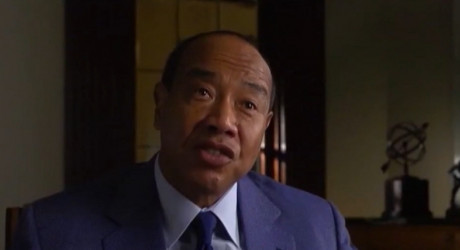.png)
Attorneys-at-law Isat Buchanan and John Clarke
Attorney-at-law Isat Buchanan is arguing that the decision by former Energy Minister Dr. Andrew Wheatley to file an application in the Supreme Court for leave for judicial review of aspects of the Integrity Commission's report regarding the state-owned oil refinery Petrojam, is the wrong one.
Dr. Wheatley filed the application on Tuesday challenging conclusions made by the Commission against him.
Mr. Buchanan believes the court will not grant the application.
"What the Integrity Commission has done is their job. Just that. The decision or the findings per se or the Integrity Commission, in my opinion, would not give rise to a judicial review; and certainly, the remedies if Mr. Wheatley thinks that he is slighted or offended by the question marks that's left, naturally the remedy - if he strongly believes he is not at fault in any way - ought to be defamation, ask them to retract. But certainly judicial review, in my view, the court would not entertain something like this," Mr. Buchanan insisted.
He was speaking Wednesday on the Morning Agenda on Power 106.
The Integrity Commission Act protects the commission from being sued for defamation.
Chuck Cameron, who is leading Dr. Wheatley's legal team wants the court to review the adverse conclusions, recommendations and findings made against Dr. Wheatley by the Director of Investigation.
He also wants an order for the Director of Investigation to recommend to the Integrity Commission that Dr. Wheatley be publicly exonerated of allegations concerning acts of impropriety and nepotism.
Attorney-at-law John Clarke, who also commented on the legal action, has a different perspective from Mr. Clarke said if the Integrity Commission failed to carry out a specific statutory duty, as is being argued by Dr. Wheatley, then the matter is susceptible to judicial review.
"The commission has a specific duty pursuant to the Act and failure to carry out that duty, there has to be in my view very good reasons for failing to carry out that duty and that itself is a matter that perhaps the court would examine the particular facts of this matter and the reasons provided by the commission to determine whether or not their actions in failing to carry out what the Act told them to carry out is above board," he reasoned.
Mr. Clarke said the decision of the Supreme Court will have implications for the work of the Integrity Commission and other public officials.
He was also a guest on the Morning Agenda on Power 106.
comments powered by Disqus








.jpg)

 All feeds
All feeds







